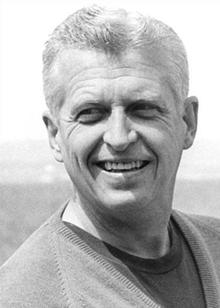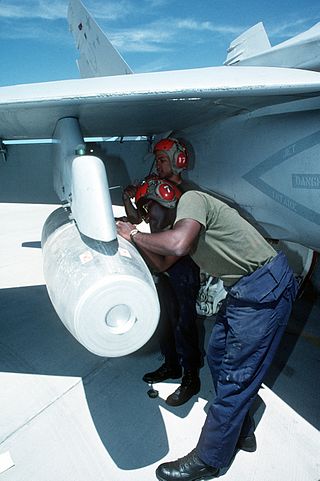Related Research Articles

Napalm is an incendiary mixture of a gelling agent and a volatile petrochemical. The name is a portmanteau of two of the constituents of the original thickening and gelling agents: coprecipitated aluminium salts of naphthenic acid and palmitic acid. A team led by chemist Louis Fieser originally developed napalm for the US Chemical Warfare Service in 1942 in a secret laboratory at Harvard University. Of immediate first interest was its viability as an incendiary device to be used in fire bombing campaigns during World War II; its potential to be coherently projected into a solid stream that would carry for distance resulted in widespread adoption in infantry flamethrowers as well.

Robert Strange McNamara was an American business executive and the eighth United States secretary of defense, serving from 1961 to 1968 under presidents John F. Kennedy and Lyndon B. Johnson. He remains the longest-serving secretary of defense, having remained in office over seven years. He played a major role in promoting the U.S.'s involvement in the Vietnam War. McNamara was responsible for the institution of systems analysis in public policy, which developed into the discipline known today as policy analysis.

Philip Francis Berrigan was an American peace activist and Catholic priest with the Josephites. He engaged in nonviolent, civil disobedience in the cause of peace and nuclear disarmament and was often arrested.

Incendiary weapons, incendiary devices, incendiary munitions, or incendiary bombs are weapons designed to start fires or destroy sensitive equipment using fire, using materials such as napalm, thermite, magnesium powder, chlorine trifluoride, or white phosphorus. Though colloquially often known as bombs, they are not explosives but in fact are designed to slow the process of chemical reactions and use ignition rather than detonation to start or maintain the reaction. Napalm, for example, is petroleum especially thickened with certain chemicals into a 'gel' to slow, but not stop, combustion, releasing energy over a longer time than an explosive device. In the case of napalm, the gel adheres to surfaces and resists suppression.

Norman R. Morrison was an American anti-war activist. On November 2, 1965, Morrison doused himself in kerosene and set himself on fire below the office of Secretary of Defense Robert McNamara at the Pentagon to protest United States involvement in the Vietnam War. This action may have been taken after Thích Quảng Đức and other Buddhist monks, who burned themselves to death to protest the repression committed by the South Vietnam government of Catholic President Ngo Dinh Diem.

Daniel Joseph Berrigan was an American Jesuit priest, anti-war activist, Christian pacifist, playwright, poet, and author.

Opposition to United States involvement in the Vietnam War began with demonstrations in 1965 against the escalating role of the United States in the Vietnam War and grew into a broad social movement over the ensuing several years. This movement informed and helped shape the vigorous and polarizing debate, primarily in the United States, during the second half of the 1960s and early 1970s on how to end the Vietnam War.

Sir! No Sir! is a 2005 documentary by Displaced Films about the anti-war movement within the ranks of the United States Armed Forces during the Vietnam War. The film was produced, directed, and written by David Zeiger. The film had a theatrical run in 80 cities throughout the U.S. and Canada in 2006, and was broadcast worldwide on Sundance Channel, Discovery Channel, BBC, ARTE France, ABC Australia, SBC Spain, ZDF Germany, YLE Finland, RT, and several others.

The War at Home is a documentary film about the anti-war movement in the Madison, Wisconsin, area during the time of the Vietnam War. It combines archival footage and interviews with participants that explore the events of the period on the University of Wisconsin–Madison campus. The film was nominated for an Academy Award for Best Documentary Feature.
The D.C. Nine were nine men and women, including seven who were priests and nuns, who engaged in a daytime protest against the Dow Chemical Company and its production of napalm and were charged with malicious destruction of property and unlawful entry. This group was part new generation of Catholic activists who undertook demonstrations in the late 1960s, such as the Catonsville Nine, that pushed the limits of Nonviolent resistance. The nine were:

The Fort Hood Three were three United States Army soldiers – Private First Class James Johnson, Private David A. Samas, and Private Dennis Mora – who refused to be deployed to fight in the Vietnam War on June 30, 1966. This was the first public refusal of orders to Vietnam, and one of the earliest acts of resistance to the war from within the U.S. military. Their refusal was widely publicized and became a cause célèbre within the growing antiwar movement. They filed a federal suit against Secretary of Defense Robert S. McNamara and Secretary of the Army Stanley Resor to prevent their shipment to Southeast Asia and were court-martialed by the Army for insubordination.

The Concerned Officers Movement (COM) was an organization of mainly junior officers formed within the U.S. military in the early 1970s. Though its principal purpose was opposition to the U.S. involvement in the Vietnam War, it also fought for First Amendment rights within the military. It was initiated in the Washington, D.C. area by commissioned officers who were also Vietnam Veterans, but rapidly expanded throughout all branches and many bases of the U.S. military, ultimately playing an influential role in the opposition to the Vietnam War. At least two of its chapters expanded their ranks to include enlisted personnel (non-officers), in San Diego changing the group's name to Concerned Military, and in Kodiak, Alaska, to Concerned Servicemen's Movement.

The Movement for a Democratic Military (MDM) was an American anti-war, anti-establishment, and military rights organization formed by United States Navy and Marine Corps personnel during the Vietnam War. Formed in California in late 1969 by sailors from Naval Station San Diego in San Diego and Marines from Camp Pendleton Marine Base in Oceanside, it rapidly spread to a number of other cities and bases in California and the Midwest, including the San Francisco Bay Area, Long Beach Naval Station, El Toro Marine Air Station, Fort Ord, Fort Carson, and the Great Lakes Naval Training Center.

GI coffeehouses were coffeehouses set up as part of the anti-war movement during the Vietnam War era as a method of fostering antiwar and anti-military sentiment within the U.S. military. They were mainly organized by civilian antiwar activists, though many GIs participated in establishing them as well. They were created in numerous cities and towns near U.S. military bases throughout the U.S as well as Germany and Japan. Due to the normal high turnover rate of GIs at military bases plus the military's response which often involved transfer, discharge and demotion, not to mention the hostility of the pro-military towns where many coffeehouses were located, most of them were short-lived, but a few survived for several years and "contributed to some of the GI movement's most significant actions". The first GI coffeehouse of the Vietnam era was set up in January 1968 and the last closed in 1974. There have been a few additional coffeehouses created during the U.S. led wars in Iraq and Afghanistan.

Waging Peace in Vietnam: U.S. Soldiers and Veterans Who Opposed the War is a non-fiction book edited by Ron Carver, David Cortright, and Barbara Doherty. It was published in September 2019 by New Village Press and is distributed by New York University Press. In March 2023 a Vietnamese language edition of the book was launched at the War Remnants Museum in Ho Chi Minh City, Vietnam.
During the 1960s, many students and professors from the University of Michigan gathered together in opposition of the Vietnam War. Together, they held a series of student protests and faculty demonstrations that challenged the U.S. government as well as the university administration. While these protests were part of a national trend, those at the University of Michigan stand out for early influence on other universities as well as their persistent nature.

The court-martial of Susan Schnall, a lieutenant U.S. Navy nurse stationed at the Oakland Naval Hospital in Oakland, California, took place in early 1969 during the Vietnam War. Her political activities, which led to the military trial, may have garnered some of the most provocative news coverage during the early days of the U.S. antiwar movement against that war. In October 1968, the San Francisco Chronicle called her the “Peace Leaflet Bomber” for raining tens of thousands of antiwar leaflets from a small airplane over several San Francisco Bay Area military installations and the deck of an aircraft carrier. The day after this “bombing” run, she marched in her officer’s uniform at the front of a large antiwar demonstration, knowing it was against military regulations. While the Navy was court-martialing her for "conduct unbecoming an officer", she was publicly telling the press, "As far as I'm concerned, it's conduct unbecoming to officers to send men to die in Vietnam."
During the Vietnam War, Harvard University was the site of a number of protests against both the war generally and Harvard's connections to the war specifically.
Napalm ladies was the name attributed to the four American women activists noted for blocking shipments of napalm bombs bound for Vietnam during the Vietnam War. The peace activists were Joyce McLean, Beverly Farquhar, Lisa Kalvelage, and Aileen Hutchinson.
References
- ↑ Ha Ha Ha McNamara, Chapter 2
- ↑ "M-TH: "Radiotime! (Prime Minister vs Robert Malecki!)". lists.econ.utah.edu. Archived from the original on 18 February 2012. Retrieved 12 January 2022.
